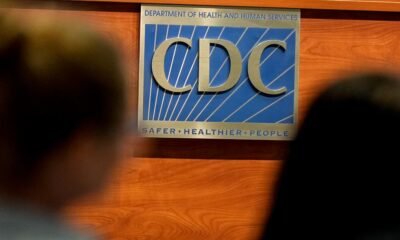abortion
RFK Jr.’s Vaccine and Abortion Flip Flops Take Center Stage at HHS Hearing

WASHINGTON — Robert F. Kennedy Jr.’s confirmation hearing on Wednesday centered on his controversial views regarding vaccines, reproductive rights, and public health. Democratic senators raised alarm over his nomination, while Republicans appeared ready to support him.
Kennedy promised to introduce “radical transparency” at the Department of Health and Human Services (HHS), yet he refrained from outlining plans for major healthcare initiatives like Medicare and Medicaid during the nearly four-hour session.
Throughout the hearing, Kennedy emphasized his objective to decrease chronic illnesses nationwide and advocated for decisions to be grounded in scientific research.
Democrats, however, questioned his capacity to enhance health outcomes, citing numerous previous claims that lacked scientific backing. Kennedy acknowledged the ongoing healthcare debate is mired in complexities, asserting, “Shifting the burden between government, insurers, and families is like rearranging deck chairs on the Titanic.”
His commitment extends to ensuring federal nutrition program spending targets “healthy foods” and enhancing oversight of food additives. “We will create a gold standard in science at HHS,” he declared, aspiring to address the chronic disease epidemic in America.
Senator Bernie Sanders, an independent from Vermont, pressed Kennedy on his inconsistent views regarding vaccine safety and abortion, asking how he could secure public confidence following his shifting positions over the past year.
Ranking member Ron Wyden echoed this concern, criticizing Kennedy for previously endorsing vaccine misinformation. “It’s nearly impossible to know where he stands,” Wyden remarked. Despite the criticism, Kennedy reiterated his support for certain vaccines, stating, “I support vaccines. The only thing I want is good science.”
Concerns about his position on abortion also surfaced during the hearing. Kennedy suggested he would implement policies aligned with President Donald Trump’s agenda on reproductive rights. Specifically, he mentioned studying mifepristone’s safety under Trump’s directives. Anti-abortion advocates seek tighter restrictions on medication abortions, complicating the role of HHS.
In addressing emergency medical treatment, Kennedy displayed uncertainty regarding the Emergency Medical Treatment and Labor Act (EMTALA), which protects patients irrespective of their insurance status. Senator Catherine Cortez Masto highlighted that an understanding of this law is essential for HHS leadership.
When pressed by Senator Bill Cassidy about Medicaid, Kennedy struggled to offer clarity on integration strategies for Medicare and Medicaid. His hesitance on basic program details raised eyebrows about his capability to navigate these complicated systems.
The hearing escalated when Senator Michael Bennet confronted Kennedy over prior statements on COVID-19 and health-related conspiracy theories. When pressed about claims tying the virus to bioweapons, Kennedy’s responses contained ambiguities that could hinder his confirmation.
As the confirmation process unfolds, Kennedy’s capacity to address these concerns will be critical in determining the Senate’s final decision on his nomination as HHS secretary.


















